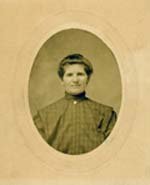Rifka (Rebecca) Chaskalevitch Lapovsky
Rifka was born in a Jewish shtetl Omstibova in modern day Belarus. She was the middle child of nine five boys and four girls. Her father died at an early age leaving the family destitute. The four daughters never had formal education. They went to work tending geese for a big landowner. Rifka was pursued by a young local man Abram Lapovsky who insisted that they marry. After a series of Pogroms systematic attacks on Jewish people the young couple decided to leave. They couldn't get into the U.S. but were given entry to England where they stayed for several years and finally came to the U.S. in 1903. Their first child Sdyney had been born in Omstibova the second Benjamin in England and the third Arthur Joseph my father in the U.S. in 1905. Their last child the first and only daughter Sarah was born thirteen years later. In the U.S. they settled in the Williamsburg section of Brooklyn near relatives. Abram worked in sweatshops while Rifka cooked and took care of the family. They had little money. I never met my grandmother but my father was very attached to her and used to tell me stories about her. My father admired her love of fresh air reminiscing how she insisted that a window be open at all times; in the winter their apartment was so cold that the water would freeze when she washed the floors. He also praised her competence in managing her household. Her home was a stopping off point for relatives who were always welcome. She cooked delicious meals that would feed all visitors. At times she would tell the children FHB Family Hold Back to make sure there was enough for the guests. As a child I was most impressed by the stories about preparations for the holidays when she would have live fish in the bathtub waiting for her to cook gefilte fish. She also was generous taking care of those in need; for instance she took in a widowed sister who had a young child. She cared for another sister who was recovering from an operation. Everyone in the family agrees that Rifka spoiled my father-- saving money for him to go to medical school. Relatives remember how she used to make them all take music lessons from him so he could earn money for his education. In the old country before he was married Abram had been a student of the Talmud earning his room and board by teaching in village homes. Upon arriving in the U.S. he became an atheist socialist and then later a Republican Rifka remained religious. She kept a traditional kosher house. However she never went to temple. She never wanted to leave her home. When Abram saved enough money to leave the sweatshops and go into business on his own he had varying success. Sometimes they lived quite well often returning to poverty when a business failed. During one of the successful periods Abram moved his wife and youngest child out of Williamsburg into a beautiful house with thirteen rooms and three floors in Flatbush against her will. She wanted to stay in Williamsburg with all her relatives. My aunt Sarah who was still living at home remembers: "On week-ends we would have a wonderful time [the relatives] would come to visit... they sat and talked . about old times. Because we were out in Flatbush; my mother was isolated. It wasn't a Jewish community. They were all gentile. The only thing she liked to do [was go with her son]to hear [the pianist] Paderweski. Outside of that she was completely devoted to her home and family. They always had parties Passover Thanksgiving". Her primary social group was her brothers and sisters; her brother Reuben was her main support. Rifka never forgot her rural roots. In Brooklyn she had a garden including a strawberry patch and fruit trees in her backyard and a mulberry tree in her front yard. In the summers she would take her daughter to Louis Cohen's farm in Accord New York. They rented a room in a large house and did their own cooking. Other members of the family would join when they could. They ate fresh produce and sometimes Rifka made cheese. Louis Cohen was a long time friend of the family and young family members would help him harvest his crops. My aunt remembers "Mother loved the farm because she didn't have to clean a 13 room house and was with family and friends". My father always told me how difficult my grandmother's life was emphasizing her hard work and that she died of leukemia at only 58. My Aunt Sarah agrees but also adds a more personal dimension talking of the strains immigration put on her mother and father's relationship. Abram had built a life for himself spending little time at home. Rifka who didn't like going out and didn't speak English was at home alone a lot particularly the year she was dying. It was a hard time during the depression Abram's business had failed and there was little money for anything even food. When I invited my Aunt Sarah who was 88 years old at the time to the dedication of the Women's Plaza of Honor she kept exclaiming "it is amazing to think that my mother your grandmother didn't speak any English and here she is being honored in this Plaza that her own granddaughter was instrumental in building". This statement vividly reminded me of my immigrant roots and how my grandmother's hard work to gain education for her children laid the ground work for the privileges I enjoy. Her generosity and love of the outdoors has continued to shape my spirit.



